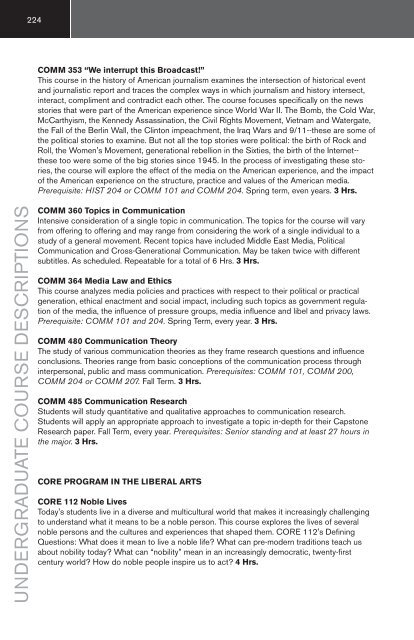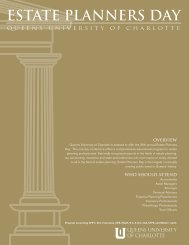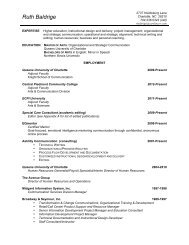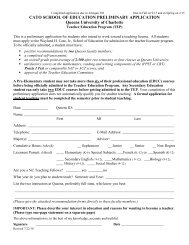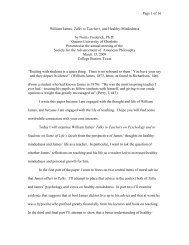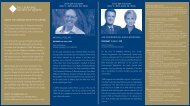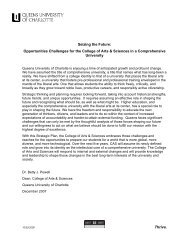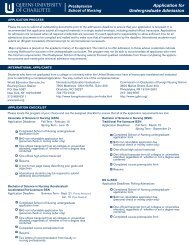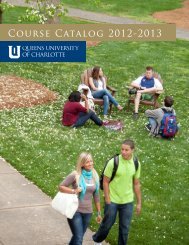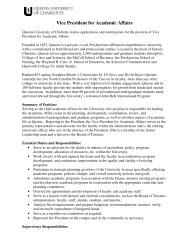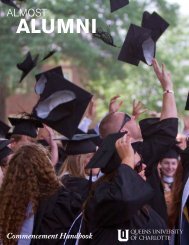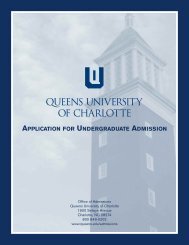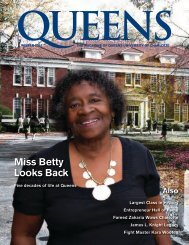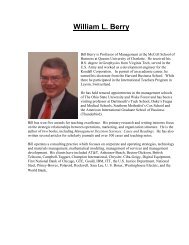2008-2009 Academic Catalog - Queens University of Charlotte
2008-2009 Academic Catalog - Queens University of Charlotte
2008-2009 Academic Catalog - Queens University of Charlotte
You also want an ePaper? Increase the reach of your titles
YUMPU automatically turns print PDFs into web optimized ePapers that Google loves.
224<br />
COMM 353 “We interrupt this Broadcast!”<br />
This course in the history <strong>of</strong> American journalism examines the intersection <strong>of</strong> historical event<br />
and journalistic report and traces the complex ways in which journalism and history intersect,<br />
interact, compliment and contradict each other. The course focuses specifically on the news<br />
stories that were part <strong>of</strong> the American experience since World War II. The Bomb, the Cold War,<br />
McCarthyism, the Kennedy Assassination, the Civil Rights Movement, Vietnam and Watergate,<br />
the Fall <strong>of</strong> the Berlin Wall, the Clinton impeachment, the Iraq Wars and 9/11--these are some <strong>of</strong><br />
the political stories to examine. But not all the top stories were political: the birth <strong>of</strong> Rock and<br />
Roll, the Women's Movement, generational rebellion in the Sixties, the birth <strong>of</strong> the Internet--<br />
these too were some <strong>of</strong> the big stories since 1945. In the process <strong>of</strong> investigating these stories,<br />
the course will explore the effect <strong>of</strong> the media on the American experience, and the impact<br />
<strong>of</strong> the American experience on the structure, practice and values <strong>of</strong> the American media.<br />
Prerequisite: HIST 204 or COMM 101 and COMM 204. Spring term, even years. 3 Hrs.<br />
UNDERGRADUATE COURSE DESCRIPTIONS<br />
COMM 360 Topics in Communication<br />
Intensive consideration <strong>of</strong> a single topic in communication. The topics for the course will vary<br />
from <strong>of</strong>fering to <strong>of</strong>fering and may range from considering the work <strong>of</strong> a single individual to a<br />
study <strong>of</strong> a general movement. Recent topics have included Middle East Media, Political<br />
Communication and Cross-Generational Communication. May be taken twice with different<br />
subtitles. As scheduled. Repeatable for a total <strong>of</strong> 6 Hrs. 3 Hrs.<br />
COMM 364 Media Law and Ethics<br />
This course analyzes media policies and practices with respect to their political or practical<br />
generation, ethical enactment and social impact, including such topics as government regulation<br />
<strong>of</strong> the media, the influence <strong>of</strong> pressure groups, media influence and libel and privacy laws.<br />
Prerequisite: COMM 101 and 204. Spring Term, every year. 3 Hrs.<br />
COMM 480 Communication Theory<br />
The study <strong>of</strong> various communication theories as they frame research questions and influence<br />
conclusions. Theories range from basic conceptions <strong>of</strong> the communication process through<br />
interpersonal, public and mass communication. Prerequisites: COMM 101, COMM 200,<br />
COMM 204 or COMM 207. Fall Term. 3 Hrs.<br />
COMM 485 Communication Research<br />
Students will study quantitative and qualitative approaches to communication research.<br />
Students will apply an appropriate approach to investigate a topic in-depth for their Capstone<br />
Research paper. Fall Term, every year. Prerequisites: Senior standing and at least 27 hours in<br />
the major. 3 Hrs.<br />
CORE PROGRAM IN THE LIBERAL ARTS<br />
CORE 112 Noble Lives<br />
Today's students live in a diverse and multicultural world that makes it increasingly challenging<br />
to understand what it means to be a noble person. This course explores the lives <strong>of</strong> several<br />
noble persons and the cultures and experiences that shaped them. CORE 112's Defining<br />
Questions: What does it mean to live a noble life? What can pre-modern traditions teach us<br />
about nobility today? What can “nobility” mean in an increasingly democratic, twenty-first<br />
century world? How do noble people inspire us to act? 4 Hrs.


